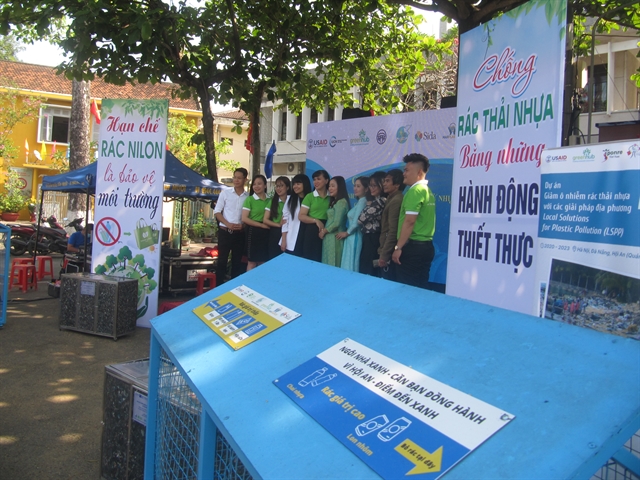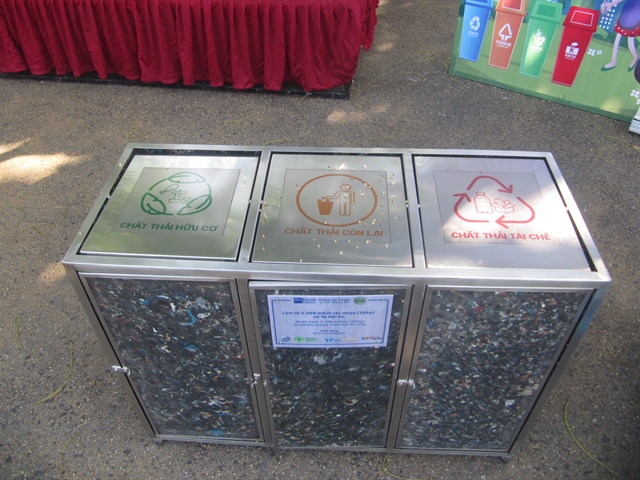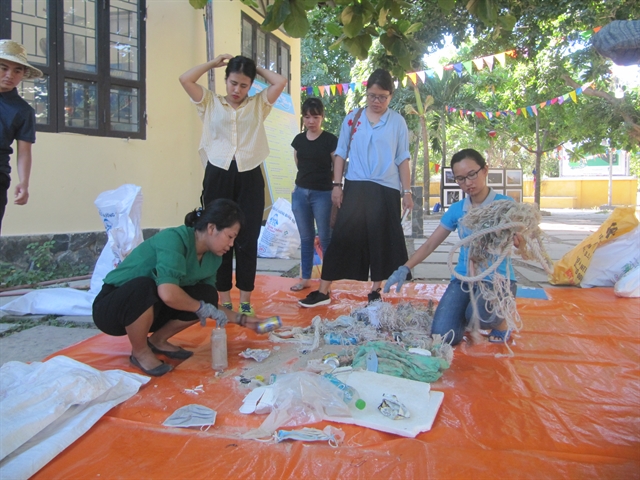
Recycled plastic dustbins and classified garbage boxes are donated to Hội An City’s women’s union, promoting plastic waste reduction among the community and tourists. VNS Photo Công Thành
HỘI AN – The International Union for Conservation of Nature (IUCN), the centre for Supporting Green Development and PRO Việt Nam have donated 54 ‘green houses’ (dust bins made from reform plastic) and waste classification tools to Hội An City’s Women’s Union to boost recycling and zero plastic waste in the community.
The dust bins, which were recycled from plastic bags, single-use straws, styrofoam and low-value plastic waste, will be used to collect the single-use plastic and low-value waste for reform into useable tools, panels and furniture in Hội An.
It also helps improve awareness in reducing plastic waste while promoting recycling among the community and tourists.
Low-value plastic waste types, including plastic bags, pieces of net, lure, fishing lines, hard plastic buoys, floating foam buoys, foam boxes; styrofoam containers, hard plastic pieces, plastic straws, food, and confectionery packages, are dumped because vendor garbage pickers cannot collect them.
In Hội An, a tourism hub in central Việt Nam, 30 per cent of daily collected waste (about 110 tonnes) is low-value plastic waste (single-use cups and straws, styrofoam, milk box and food packages).
Tourist trading activities accounted for 40 per cent of daily waste in Hội An.

A dustbin made of reform single-use plastic straws and cups, styrofoam and low-value waste. Hội An will promote recycling waste in building a ‘zero plastic waste’ destination. VNS Photo Công Thành
Evergreen Labs set up the reform plastic factory to classify and recycle 1,000 tonnes of low-value plastic waste in Hội An.
The Chàm Islands, 20km off the coast of Hội An, have officially banned plastic single-use straws and cups and plastic bags.
About 100 businesses in Hội An committed to reducing 30 per cent single-use plastic and recycling 50 per cent of organic waste.
The ‘green houses’ programme has been implemented in the Marine Plastics and Coastal Communities initiative framework with support from the Swedish International Development Cooperation Agency, the Local Solution for Plastic Pollution, sponsored by the United States Agency for International Development.
Bùi Thị Thu Hiền, Marine and Coastal Resources Program Coordinator at IUCN (Việt Nam Office), said IUCN had launched a new garbage sorting programme as part of efforts to reduce plastic waste in Việt Nam.
Hiền said IUCN and Greenhub had supported Marine Protected Areas staff in Việt Nam to identify plastic waste, build a database on plastic waste, and offer policy advice on reducing plastic waste and plastic production.

Low-value plastic waste is collected for classifying in Chàm Islands, off the coast of Hội An. VNS Photo Công Thành
Tân Thành weekend flea market on An Bàng beach, 5km from Hội An, has been building ‘green’ beach tourism by boosting plastic-free and zero-waste recycling among the community and tourists.
Chàm Islands and Cẩm Thanh commune, two favoured destinations in Hội An, have been building as the first ‘zero waste’ sites in central Việt Nam. VNS